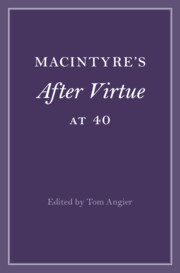Book contents
- MacIntyre’s After Virtue at 40
- Cambridge Philosophical Anniversaries
- MacIntyre’s After Virtue at 40
- Copyright page
- Contents
- Contributors
- Introduction
- Part I After Virtue and Ethical Theory
- Part II After Virtue and Political Theory
- 4 After Virtue’s Critique of Liberalism
- 5 After Virtue and the Rise of Postliberalism
- 6 After Virtue and Conservatism
- 7 After Virtue as a Real Utopia
- Part III After Virtue and Narrative
- Part IV After Virtue beyond Philosophy
- Bibliography
- Index
7 - After Virtue as a Real Utopia
from Part II - After Virtue and Political Theory
Published online by Cambridge University Press: 12 October 2023
- MacIntyre’s After Virtue at 40
- Cambridge Philosophical Anniversaries
- MacIntyre’s After Virtue at 40
- Copyright page
- Contents
- Contributors
- Introduction
- Part I After Virtue and Ethical Theory
- Part II After Virtue and Political Theory
- 4 After Virtue’s Critique of Liberalism
- 5 After Virtue and the Rise of Postliberalism
- 6 After Virtue and Conservatism
- 7 After Virtue as a Real Utopia
- Part III After Virtue and Narrative
- Part IV After Virtue beyond Philosophy
- Bibliography
- Index
Summary
Alasdair MacIntyre’s After Virtue has become one of the most influential sources for the new, illiberal right in the last ten years – inspiring popular political tracts such as Patrick Deneen’s Why Liberalism Failed and Rod Dreher’s The Benedict Option. After briefly summarising the problems with these reactionary readings of MacIntyre’s philosophy, I argue, instead, that MacIntyre’s work might be read as a form of radical democracy and utopian thought in line with his earlier efforts as part of the British New Left. This means reading MacIntyre’s philosophy against reactionary, illiberal visions of pre-modernity seen in the writings of Deneen, Dreher and other postliberals. Although MacIntyre’s virtue ethics is frequently seen as a negation of liberalism, it should instead be read as radicalising and fulfilling certain themes and conceptions of liberal democracy. On this reading, After Virtue is not orientated so much to the past as to imagining a future, more profoundly participatory democratic polity. Concepts introduced by MacIntyre into Aristotelian philosophy such as practices, traditions and narrative quests are the basis for a radically new and yet unrealised form of democratic community. Likewise, his critique of technocracy is part of a turn towards bottom-up politics. MacIntyre’s After Virtue is not a call for religious or ethnic homogeneity or reaction, but for democratic inclusion and utopian striving.
- Type
- Chapter
- Information
- MacIntyre's After Virtue at 40 , pp. 125 - 140Publisher: Cambridge University PressPrint publication year: 2023

